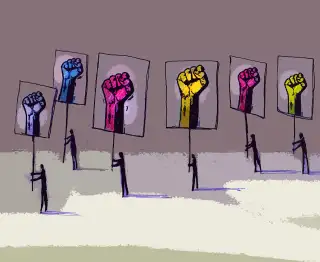Women Have Pushed for Equal Pay for Decades. It's Sad How Little Progress We've Made

Women are sick and tired of talking about the gender wage gap.
The persistent issue has plagued women and particularly women of color for decades — so much so that there was an official Equal Pay Day established in 1996. But despite the growing #MeToo movement and increased attention on the equal pay disparity, research shows little progression on closing the gender wage gap.
Over the last 10 years, the gender wage gap has seen little change. Indeed, between 2016 and 2017, the gap for full-time workers with weekly salaries actually grew wider by 0.1 percentage points, according to the Institute for Women’s Policy and Research. The numbers for full-time workers with annual salaries isn’t expected to budge, either.
In fact, much of the progress made on equal pay and closing the wage disparity over the years happened in the 1980s and 1990s. Between 2008 and 2017, however, it has only decreased by 2 percentage points. “Basically, progress in closing the wage gap has really slowed down,” said Ariane Hegewisch, program director for employment and earnings at the Institute for Women’s Policy Research.
The most recent research shows women in the United States make $0.80 on the dollar compared to their male counterparts, according to the Institute for Women’s Policy and Research. That gap is wider for black and hispanic women, who earn 62.5% and 54.4%, respectively, of the paychecks their male colleagues receive. Every year, advocates talk about closing the gender wage gap on Equal Pay Day — which falls on April 10 this year — and pull out these numbers to show the scope of the issue. But that strategy is getting exhausting and at this rate, pay parity won’t be achieved until 2059.
“Frankly, I am tired of talking about 80 cents on the dollar,” said Kimberly Churches, the CEO of the American Association of University Women. “I don’t want to get out the violin again and talk about how we’re stalled on this process.”
The U.S. is far behind some countries in the European Union and others have created policies pegged at creating more pay transparency. Sweden, Finland and Norway, for example, have taken this philosophy a step further by making everyone's tax returns available upon request. "Pay transparency is important in order to promote gender-neutral wage-setting structures," a April 2017 report from the European Commission detailing these practices said.
There are a host of factors contribute to the gender wage gap, including occupational segregation. That means there is little integration between male- and female-dominated occupations, including the male-centric jobs like construction or software development. Though it's just one example of how the gender wage gap continues, advocates and female leaders are pushing for policies and initiatives that can help create a culture shift in workplaces that would pave the way for pay parity.
In a number of cities, companies are now barred from asking prospective employees about their salary history — a move intended to halt the continuation of paying people, especially women, a smaller wage. Another initiative focuses on pay transparency within companies, so employees can be better leverage themselves in negotiations and hold their employers more accountable.
Those are some of the pushes Churches said the AAUW will be focused on. “You’re not going to hear AAUW talk about, ‘Whoa was me, we’re still 80 cents on the dollar,’” Churches said. “You’re going to hear much more from us about what are the solutions to achieve parity quickly.”
But the onus to change company policies by making more payroll audits or bringing more diversity into boardrooms really falls on business leaders and politicians. Advocates point to the latter as vital for creating more equal workplaces for women overall — especially in wake of this national conversation about sexual harassment in the workplace.
“I think the concern I have is that it is in everybody’s power and agency to make a little change,” said Andrea Jung, the CEO of Grameen America, a microfinance business that helps women who live in poverty. “To wait for who? Wait for the CEO? Wait for the head of HR? Wait for policy? We’re going to be waiting forever.”
And to achieve that action, women will continue to spread awareness about the wage gap and how it can be closed.
“I’m tired of talking about it, 30 years in, but that’s OK,” said Patty McCord, an author and former Netflix chief talent officer credited for disrupting workplace culture in Silicon Valley. “We’ll keep talking about it.”